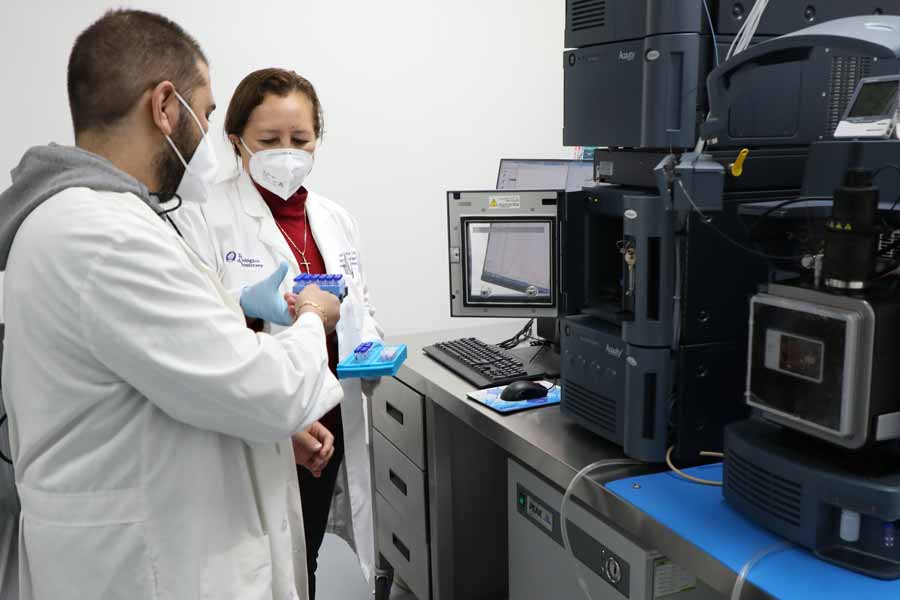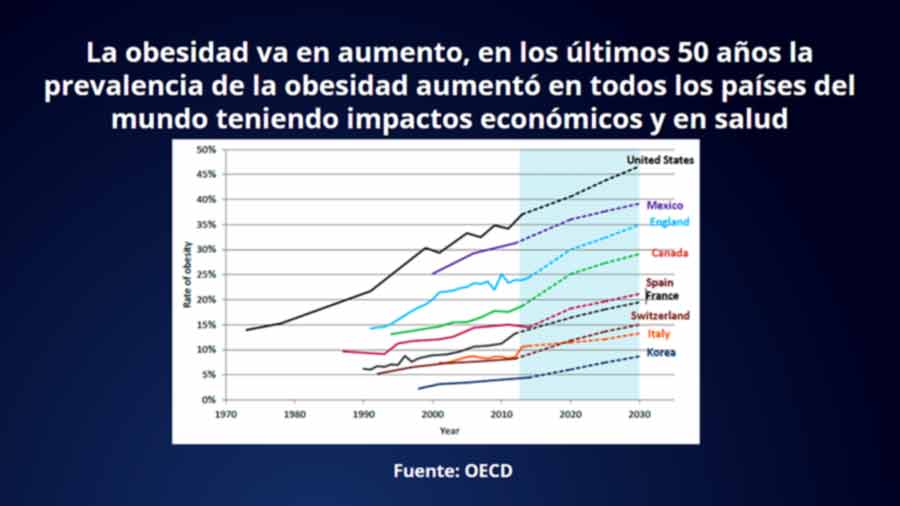Tec de Monterrey has announced The Institute for Obesity Research, a new research institute to address solutions to the obesity problem in Mexico and Latin America.
“We believe we have the ability and the responsibility to carry out high-impact research that translates into benefits for society,” said David Garza, Rector and Executive President of Tec de Monterrey.
“The Tec wants to solve this major problem of obesity in Mexico and around the world,” said Guillermo Torre, Vice President of Research at the Tec and Rector of TecSalud.
“Obesity is a multifactorial problem. We can’t try to look at this problem, which causes some of the biggest health complications not just in Mexico, but in every developed nation, from one single angle,” he added.
The institute was announced during the International Conference on Obesity Research.
Research that impacts society
When opening the conference at the Monterrey campus on February 8, Garza said that the Tec has proposed creating 3 or 4 institutes to focus on high-impact areas in Mexico and the world.
“The first was the Institute for the Future of Education, based on our credibility and positioning. Today, we’re launching the second institute (The Institute for Obesity Research).
“This commitment is made by Tecnológico de Monterrey as an institution of society for society. Today, we’re taking the first step towards The Institute for Obesity Research with this conference.
Garza noted that the Tec can combine its engineering, medical, and public policy capabilities to focus on this problem.
“We also have the international relations and partnerships that allow us to become a hub where we can bring researchers together, since we recognize that we aren’t able to do everything here. We have to team up with other international leaders.”
The pillars of this institute
Dr. Torre explained that the institute will seek integrated solutions focused on 4 objectives:
- Generating knowledge
- Developing therapies and devices
- Setting up science and technology companies that promote metabolic health
- Supporting decision-making for healthier societies

He also explained that the institute will be made up of 5 research units, each focused on a specific area:
One of them will be Experimental Medicine and Advanced Therapies, run by Dr. Gerardo Rivas. Another will be Bioengineering and Medical Devices, under Dr. Marco Rito.
There will also be the Healthy Food unit, run by Dr. Janet Gutiérrez; the Integrative Biology unit, under Dr. Rocío Díaz; and the Public Enterprise and Policy unit, under Dr. Gustavo Merino.
This effort will be multidisciplinary with at least 3 of the Tec’s schools: Medicine and Health Sciences; Engineering and Sciences; and the School of Government, as well as many of the institution’s laboratories.
Investigating healthy diets
Some of the topics they hope to explore in the Healthy Food unit are knowing which foods to consume and our nutritional needs, says its leader, Dr. Janet Gutiérrez.
The specialist adds that some of this unit’s activities will help them to develop food ingredients that benefit health, alongside other units from the institute and stakeholders such as companies or organizations.
“It’s about finding the balance between what’s good for us and what the industry needs, so as to incorporate that into products without making them more expensive.
“We’ll be investigating how to make enough healthy ingredients available for the industry to incorporate into its food products, which will also be done via tech startups,” says Gutiérrez.

Seeking to develop new technology
Dr. Marco Rito, leader of the Bioengineering and Medical Devices unit, points out that his unit’s main objectives include generating mass-market technology for products or ingredients generated in other units.
“For example, if the Healthy Food unit finds an ingredient that’s going to have a positive effect on a metabolic disease, (our goal is) to ensure feasible mass production of this type of ingredient,” Rito illustrated.
The expert says they will also seek to identify sensors or biosensors that are present in saliva, blood, or other fluids, which might indicate risk in each individual.
This is with the aim of identifying any health problems so as to monitor or even anticipate diseases or conditions such as diabetes.
“What’s the aim? To generate cutting-edge knowledge with scientific rigor. We need to provide innovative solutions to this major problem,” he said.
Exploring new drugs and new therapies
Dr. Gerardo García Rivas says that understanding a disease could be a start to stopping its progression and creating improved metabolic disease therapies.
“If we understand how a disease progresses, we’re able to stop it progressing and prevent it,” he explained.
The specialist highlights that part of the work of the Experimental Medicine and Advanced Therapies unit he leads is exploring these new therapies or drugs.
It will also look at their use in preventing and treating metabolic and cardiovascular diseases, among others.
“Understanding what’s behind a disease on a molecular level will allow us to propose and evaluate new molecules, new medicines, new types of antibodies, and new types of foods.
“We’re able to obtain cells from human beings who have metabolic disorders, or who are prone to cardiovascular disease, and expose them to drugs to see if they’re really achieving the effect,” says García.
Working to influence public enterprise and policy
Dr. Gustavo Merino, leader of the Public Enterprise and Policy unit, says they’re looking to research and develop public policies that directly or indirectly influence obesity.
“In Mexico, approximately 73% of the population is overweight. This isn’t just a risk factor for people, but for society and the economy,” said Dr. Merino.
“The unit will carry out research and analysis on social, economic, and legal factors affecting obesity and diet, but we also want to understand their impact on society and the economy.
Some of the areas mentioned by the doctor include urban development that enables a healthy lifestyle and exercise, as well as policies on diet, food security, and the cost of obesity.
“Through the sphere of public policy, we can improve people’s conditions, reduce obesity, and improve nutrition,” said Merino.
Seeking to integrate data and knowledge
The research carried out by the units making up The Institute for Obesity Research can yield massive amounts of data.
Dr. Rocío Díaz, head of the Integrative Biology unit, explains that her job is to gather the data generated by other units at the institute in order to analyze and interpret them.
“Precisely what we’re going to do in this unit is to integrate the knowledge generated in other units and that which we generate ourselves.
“A lot of data is needed for this integration to take place. This unit will be in charge of generating and integrating that data,” says Díaz.
The doctor explains that the unit’s team, which may include students and teachers, is made up of members from Engineering and Medicine who can analyze the so-called Big Data.
Highlights from the International Conference on Obesity Research
This conference included keynote speeches from experts in the field.
- Obesity takes years off life
Frederico Guanais, Deputy Head of the Health Division at the Organisation for Economic Co-operation and Development (OECD), said that obesity reduces life expectancy.
“Mexicans live on average 4.2 years less due to being overweight. Obesity reduces their life expectancy. Of all the countries belonging to the OECD, Mexico has been impacted the most due to obesity.”
“This also affects economic productivity. We estimate that millions of workers a year are unavailable due to absenteeism or early mortality. What’s more, in Mexico, obesity accounts for 9% of healthcare expenditure,” he explained.
He highlighted that issues related to obesity reduce Mexico’s Gross Domestic Product (GDP) by 5.3%.
The expert said that a package including labeling and public policies, prescription of physical activity by physicians, and wellness programs at work could save 465 million pesos a year in health costs.
- Molecular Biomedicine
German professor Karsten Haupt explained the importance of biomedicine and technology in the development and application of biosensors in areas such as immunoassays and medical treatments.
However, he noted that these are unstable and sometimes difficult to obtain, tend to be expensive, and are often difficult to integrate into industrial processes.
Nevertheless, he points out that some proteins and biomolecules can be developed to deal with situations and diseases such as obesity, diabetes, and even other conditions.
He also explained that there is research work on molecularly imprinted polymers (MIP particles) and nanoparticles that can shrink or fight tumors.
“Biomedicine holds promise for the development of therapies and for diagnosis. Adding MIP particles could possibly work in synergy with chemotherapy,” says Haupt.
- Foodomics: food research on a cellular level
Alejandro Cifuentes, Researcher and Director of the Laboratory of Foodomics at the National Research Council of Spain, talked about the analyses carried out on food products and their relationship with health.
During his speech, “Foodomics: 21st Century Schizoid Food Science”, the researcher reflected on the benefits of investigating food on a molecular level.
“We define Foodomics as a discipline that studies the domain of food and nutrition through the application of advanced omics technologies to improve the wellbeing, health, and knowledge of consumers,” he explained.
The idea is for these omics techniques, which are commonly used in biotechnological, clinical, and pharmacological fields, to be transferred to areas of study such as food safety.
“Using passive monitoring tools in the service of food science and technology allows us to resolve issues associated with the relationship between food and health.”
Some of his research has focused on issues associated with the bioactivity of food and its impact on diseases such as colon cancer and Alzheimer’s.
- Obesity during pregnancy
Chilean researcher Luis Sobrevia presented the results of his own studies and that of other researchers on obesity during pregnancy and its relationship to the development of diseases such as childhood diabetes.
In addition to highlighting aspects such as nutrition, genetics, physical activity, and even the supply of folic acid, the expert highlighted the importance of a healthy diet during pregnancy.
“Certain women of childbearing age are obese, and that’s where it gets serious. We have a 20% increase in women of childbearing age with a diagnosis or prevalence of obesity.
“(In one study) we observed various functional modifications in a laboratory, both in the placenta and in the umbilical vessels. We believe that when these children are born, it seems they might have insulin resistance,” he explains.
Dyslipidemia, vascular dysfunction in both mother and child, hyperinsulinemia, and child obesity are just some of the alterations noted by Sobrevia, which might not only be seen at birth, but also in adult life or even old age.
“We have a 20% increase in women of childbearing age with a diagnosis or prevalence of obesity.” - Luis Sobrevia.
- Gut microbiota and its relationship to obesity
Dr. Samuel Canizales shared advances in gut microbiota research and its impact on obesity.
“It’s clear that hypercaloric diets are where energy is stored, and if energy expenditure decreases, it’s a classic predisposing factor for the development of obesity.
“However, not everyone consistently gains weight, which leads us to think there are other factors that play an important role in developing obesity,” he said.
During the conference, he shared data and research that indicate there are factors from the microbiota which seem to directly influence excess weight and obesity in certain people.
The gut microbiota is responsible for producing vitamins and regulating the immune system, among other things, which is why Canizales says that its development during childhood seems to have an impact on people’s dietary health as they grow.
Regarding the creation of new therapies or drugs to promote a gut microbiota that reduces the risk of obesity, Dr. Samuel said that there has been progress, albeit slow.
“There has been an improvement, but we must keep working on it. One solution could be a change in lifestyle together with microbiotics, but only in the long term,” he said.
READ MORE:





